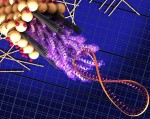MIT’s genetically modified viruses boost solar-cell efficiency by herding nanotubes

The wizards of MIT have done it again. Having checked artificial leaves and Operabots off the to-do list, they’ve moved on to improving the efficiency of solar cells. Their technique combines a genetically modified version of the M13 virus with carbon nanotubes, which have already been shown to increase efficiency. Unfortunately, some nanotubes enhance solar cell performance, while others inhibit it – and both types tend to clump together, negating their benefits. The modified M13 virus, however, can separate the two types as well as prevent clumping; we’ve seen similar use of the Tobacco mosaic virus to build better electrodes . Adding virus-built structures to dye-sensitized solar cells increased power conversion efficiency by almost one-third and, with only one additional step in the manufacturing process required, the new approach could be rapidly taken up by existing production facilities. MIT: proving once again that viruses are good for more than just smiting your enemies. MIT’s genetically modified viruses boost solar-cell efficiency by herding nanotubes originally appeared on Engadget on Wed, 27 Apr 2011 19:17:00 EDT. Please see our terms for use of feeds . Permalink